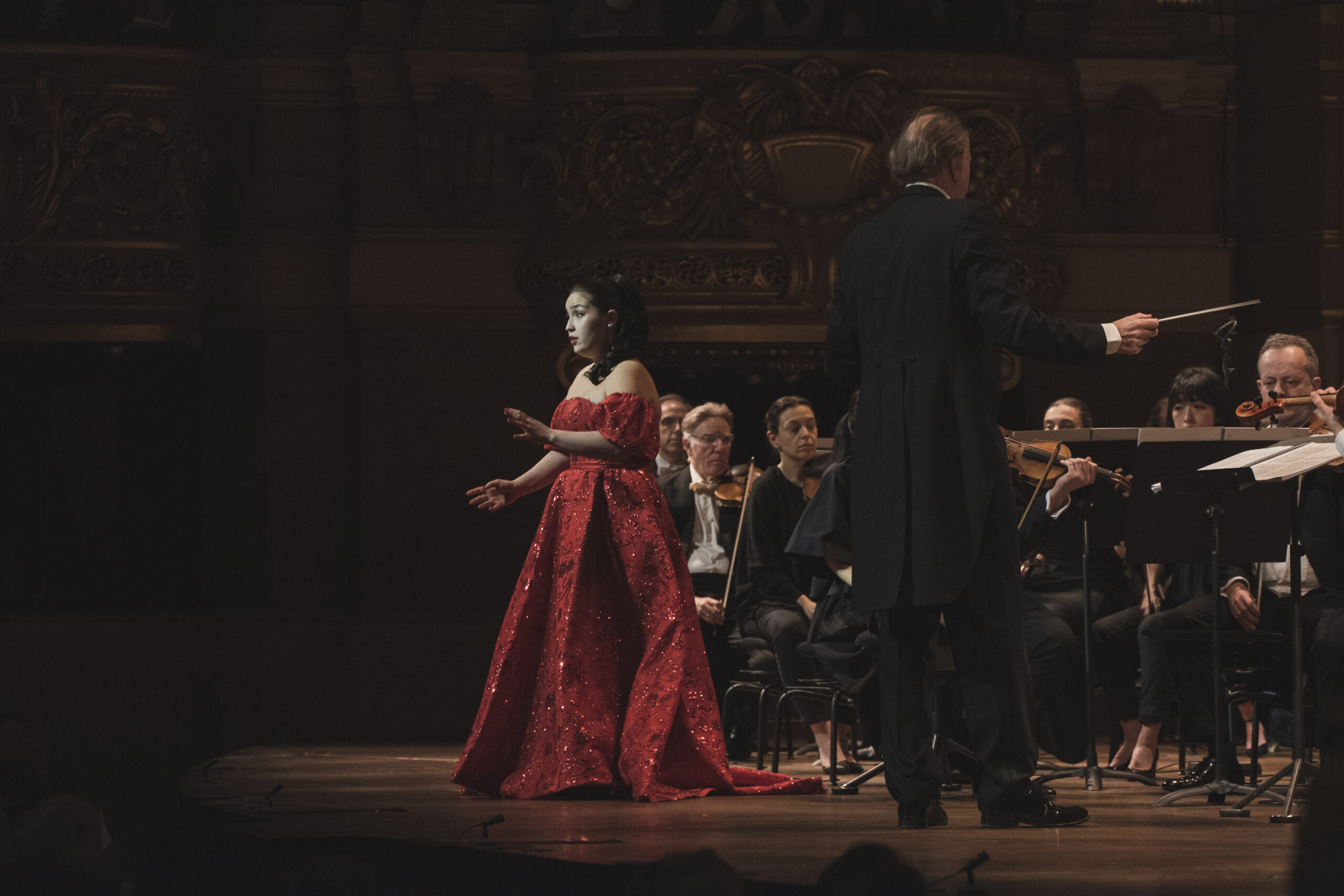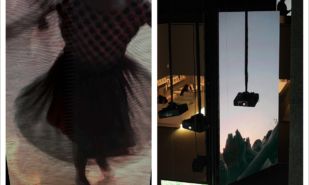On 24 January 2024, the Paris Opera Academy concert was held at the Opéra Garnier. It was an opportunity for young talents to show their skills to potential employers from other opera houses. The concert was attended by the Opera’s Director Alexander Neef, media representatives, agents and other professionals from the opera world. Founded in 2015, the Paris Opera Academy is directed by Myriam Mazouzi and 28 artists are in residence this season. Singers prepare for this event during the year, with a programme selected by the Academy’s Artistic Director Christian Schirm for each one to showcase their vocal range and artistic talents. This evening, Mozart’s music filled the first act (with arias from the rarely performed La Finta Giardiniera and La Clemenza di Tito, as well as the more famous tragi-comic piece from Don Giovanni, when Leporello, disguised as his master, is accused of all the deadly sins by all Don Giovanni’s victims. The second act featured arias from Puccini’s Turandot, Wagner’s The Flying Dutchman, Verdi’s Luisa Miller, Donizetti’s Don Pasquale and Tchaikovsky’s Eugene Onegin. The young singers came from all over the world to study at the Academy: tenor Kevin Punnackal from the USA, bass-baritone Luiz Felipe Souza from Brazil, mezzo-soprano Seray Pinar from Turkey, baritone Andres Cascante from Costa Rica, soprano Boglárka Brindás from Hungary, young singers from France, as well as three talents from Ukraine (the magnificent bass-baritone Ihor Mostovoi, the strong and artistic mezzo-soprano Sofiia Anisimova and the delicate and lyrical Teona Todua), as well as Margarita Polonskaya, the graduate of the Gnessin Academy in Moscow and the Mozarteum in Salzburg. London Cult. managed to get backstage of the world-renowned Paris Opera and talk to Margarita in the cosy surroundings of the Academy about what it is like to study at this programme and what are the prospects for young singers after graduating from it.
Where the stars are born: insights into the Academy of the Paris Opera House
| Author | |
|---|---|
| Category | Columnists, Culture, Lifestyle, Town |
| Date | January 29 2024 |
| Reading Time | 6 min. |
Where the stars are born: insights into the Academy of the Paris Opera House

Margarita, can you tell us about the Academy programme and how do you get in?
Many opera houses around the world have similar programmes for young singers. It is an intermediary step between studying at the Conservatoire and working as a soloist in a theatre. Most often the applications to such programmes are online, as you have to send an application form, a CV and two or three videos (most often they ask you to sing Mozart). If you are selected, you are invited to a live audition and you have to physically be there – in my case it was Paris. The first round was on a small stage, and the second round was the final where 20 people sang on the big stage, either the Bastille or the Garnier. They choose as many as they need for the Academy for the next season. I applied to 10-15 places that year, and the invitation to audition came only from Paris. By that time I had participated in major competitions, but had no grand achievements, while for such programmes you need something of the kind. I didn’t expect to get in, but I did. Our contract is from September 2023 to the end of June 2024, with an option to extend for another year. If some are offered working contracts, of course they leave. But this year I also saw a recruitment advertisement for the Paris Opera Company for the next season, applied online and was accepted, so I’m staying in Paris for the next season too. Then we’ll see if they’ll keep me working with them.
I get the feeling that the Academy is international this year, is the impression correct?
Actually, the Paris Opera is trying to open its doors and to invite more people from different countries, but in France the public really loves and supports French singers. They will always choose a French person over any other, as it comes with their national pride. Some audiences complain that there are not enough French singers in the Company. People are also worried about the Academy, they wish there were more French people studying there. I understand them, as the Academy is funded from state taxes, but on the other hand, art should not be privatised by any nationality. The most important thing is talent and diligence, nationality should not play a major role.

What are the specifics of this programme compared to similar ones in other theatres?
All programmes are different, it depends on the goals of the opera house. We have some differences from similar programmes in Germany, for example, because the emphasis is on making us grow artistically and vocally, which means there is an emphasis on training coaches. One or two famous vocal coaches come to us every month, pianist coaches come as well, and there is a concert every month. In Germany there is a big emphasis on stage experience: there the singers appear on the big stage, and are given small and big roles. Here in two years of the Academy not everyone manages to sing even a small role on stage. I was lucky, as last year, in my first year at the Academy, I sang my first role – the first lady in The Magic Flute, and next year I will repeat that role. Our Academy also produces at least one production every year with only Academy members involved (our artists, pianists and other musicians). Everyone here is from different backgrounds, and for some it will be their first experience on stage.
Do you plan to perform Russian repertoire and use your knowledge of the language?
We all work with coaches and get rid of the accents in foreign languages. I believe that a singer should sing in different languages, depending on the chosen repertoire. However, I love to sing in Russian. I didn’t choose the Russian programme I was given to sing in the concert. Last year at the concert of French women composers I also sang Russian songs by Pauline Viardot. Here Christian Schirm gives me something to sing in Russian, but in Salzburg I sang mostly in German. In two years’ time they will be staging Eugene Onegin here, and we had the director of that production come to Paris, it was the British actor and director Ralph Fiennes. We had a workshop with him in September, and he’s coming again. He’ll be directing Eugene Onegin at the Paris Opera, but the point is that he has never directed an opera production before, so he has asked the Opera to give him some singers to work with. I’m hoping that maybe I could at least cover Tatiana in his future production. It was really nice to be trusted with this, it was incredible, although it only lasted three days. He’s a great actor and a good director. He was with us the whole time, during the rehearsals of Tatiana’s letter he was sitting right in front of me, walking with me, showing me where to move. It was an incredible process, something we love art for.

How does a day of work at the Academy go?
It depends on what we are preparing for, what concerts and programmes we have ahead. We have a day from 10am to 6pm, but sometimes there are also rehearsals at 8pm. There is a schedule for the whole year and we also get a weekly schedule. There are never more than three coaches a day. So you warm up, then you have coaches, have lunch, in the evening we all stay to learn and rehearse more. The opera building doesn’t close at night, you can study here as much as you need. There are four pianists in the Academy – we can’t use them much, as they also have 35 hours a week in their contracts, but they are always willing to help if you need to practise or make a recording. The main thing is to treat each other nicely.
What are you rehearsing now? What roles will you be seen in next year?
We have a new Academy production coming up – Kurt Weill’s Street Scene. Rehearsals start on 22 February, but by that time we have to have learned everything, and there’s a lot to learn. In 10 days we have young singers from a similar programme from the Met coming to us, and there will be a joint concert. At the end of the year there will be another workshop – a staged concert consisting of arias and songs. The Academy also has a director and he will choose the music, organise the lights and props for this – it will be his final project. In the next season as a member of the Paris Opera Company I will sing in The Magic Flute, will also appear as one of the daughters of the Rhine in Das Rheingold. I will also sing in one opera from Puccini’s Triptych – in Suor Angelica – and also will appear as Berta in Rossini’s The Barber of Seville, and I will even have a small aria there.

What is the rehearsal process like at the Paris Opera?
Actually, it is the same as everywhere else. We rehearse in one of the rehearsal halls, there are some props there, but they are not necessarily the ones that will be used in the production. We work out the mise-en-scènes, and only a week before the production we go on stage and act in the real sets. Often some singers are absent, they are replaced by extras or those who cover the stars. Rehearsals are always recorded and recordings are sent to those who arrive later.
Who would you like to sing with in the future?
I would love to work with Anna Netrebko on the big stage, or with Olga Peretyatko, with Lisette Oropesa. I can go to rehearsals and listen to them here, it is such a joy! I don’t have time to go to other cities and opera houses, but between my classes and sessions with voice coaches I come in and watch them rehearse on stage. We also can watch all the productions for free – five seats per production are allocated for the Academy artists, and it is a great privilege.

What is the development of your voice like?
With vocalists it’s very hard to define a particular point, as everyone has their own ideas of good and bad singing. There are some standards – singing clearly, hitting the correct notes, using the right vibrato and right positions. Of course, there is a difference between students and singers who already have experience of performing on stage. This is where experience has to be gained, and you can’t just wake up being famous. Nothing happens like that in this sphere, and often voices properly develop much later in your career. For instance, I had a situation when two years ago I didn’t win a prize at a competition, and I was told by a jury member that I should wait two years, as the technique was there, but the voice was not mature enough. Everything depends on human physiology. If the technique is unstable, you have to practise every day and preferably with a coach. You always need an outside perspective – you can’t just enjoy yourself, people will enjoy your singing, but you are here to work. After a big break, it’s always hard to find a place for your voice, but with experience you know how to come back to where you were. Of course, it’s better to sing a little bit every day.




